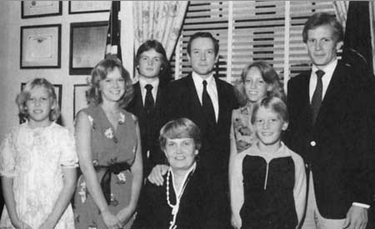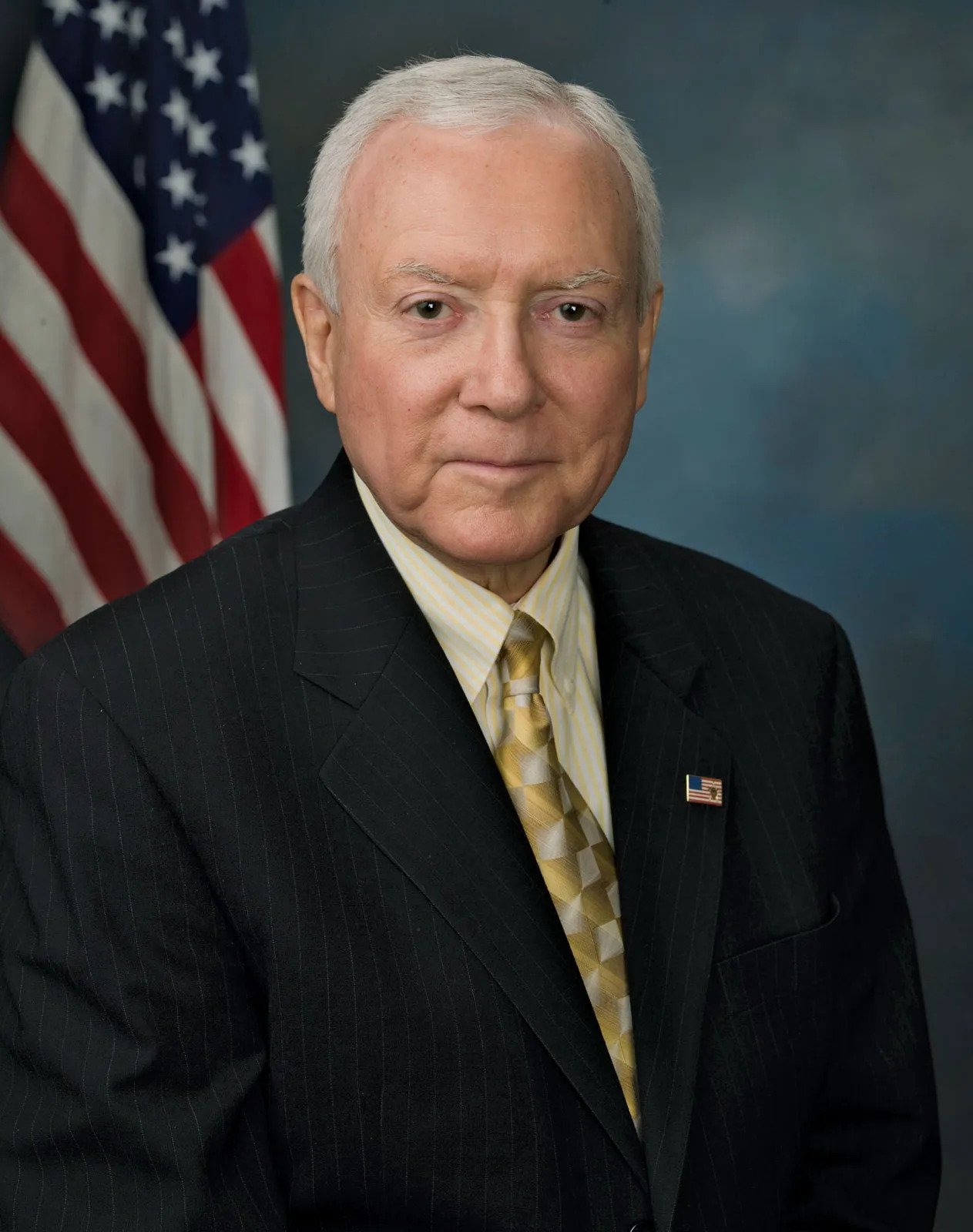 Orrin Grant Hatch, a lifelong devout member of The Church of Jesus Christ of Latter-day Saints, was born on 23 March 1934, in Homestead, Pennsylvania, a suburb of Pittsburgh. He was the son of Jesse Hatch (1904–1992), a metal lather, and his wife Helen Frances Hatch (née Kamm; 1906–1995).
Orrin Grant Hatch, a lifelong devout member of The Church of Jesus Christ of Latter-day Saints, was born on 23 March 1934, in Homestead, Pennsylvania, a suburb of Pittsburgh. He was the son of Jesse Hatch (1904–1992), a metal lather, and his wife Helen Frances Hatch (née Kamm; 1906–1995).
Although Hatch was born in Pennsylvania, his parents had been raised in Utah and he had ancestors who were members of the Church in Nauvoo, Illinois. He served a two-year mission for the Church in what was called the “Great Salt Lakes States Mission,” which essentially covered large parts of Indiana, Michigan, and Ohio. He later served in various positions in the Church, including bishop.
Hatch had eight brothers and sisters, two of whom did not survive infancy. His older brother, Jesse, a U.S. Army Air Force nose target gunner with the 725th Bombardment Squadron was killed when the B-24 he was aboard was shot down over Austria on 7 February 1945.
 He grew up in poverty and was the first in his family to attend college. He attended Brigham Young University (BYU) and earned a Bachelor of Arts in history in 1959. While at BYU, he was also an amateur boxer and fought 11 bouts. In 1962, Hatch received a Juris Doctor from the University of Pittsburgh School of Law. While in law school, he and his young family lived in a refurbished chicken coop behind his parents’ house. He worked as an attorney in Pittsburgh and moved to Utah in 1969, where he continued to practice law.
He grew up in poverty and was the first in his family to attend college. He attended Brigham Young University (BYU) and earned a Bachelor of Arts in history in 1959. While at BYU, he was also an amateur boxer and fought 11 bouts. In 1962, Hatch received a Juris Doctor from the University of Pittsburgh School of Law. While in law school, he and his young family lived in a refurbished chicken coop behind his parents’ house. He worked as an attorney in Pittsburgh and moved to Utah in 1969, where he continued to practice law.
 Orrin Grant Hatch served as a Utah senator from 1977 to 2019. He was the former pro tempore of the United States Senate. At the end of his final term, in January 2019, he was the ninth-longest-serving U.S. senator in American history, the longest-serving Republican, and the longest-serving senator in Utah history. He served during the administrations of seven Presidents and sought the Republican presidential nomination in 2000 before withdrawing his candidacy at the end of January 2000. When he retired, Hatch was known for having passed more legislation into law than any other senator alive. The Hatch Foundation said he sponsored or co-sponsored more than 750 bills in total that became law.
Orrin Grant Hatch served as a Utah senator from 1977 to 2019. He was the former pro tempore of the United States Senate. At the end of his final term, in January 2019, he was the ninth-longest-serving U.S. senator in American history, the longest-serving Republican, and the longest-serving senator in Utah history. He served during the administrations of seven Presidents and sought the Republican presidential nomination in 2000 before withdrawing his candidacy at the end of January 2000. When he retired, Hatch was known for having passed more legislation into law than any other senator alive. The Hatch Foundation said he sponsored or co-sponsored more than 750 bills in total that became law.
In 1996, he supported the Defense of Marriage Act (DOMA), which prevented same-sex couples whose marriages were recognized by their home states from receiving the same benefits available to heterosexual couples under federal law. In 1977, The Salt Lake Tribune reported that Hatch told students from the University of Utah, “I wouldn’t want to see homosexuals teaching school any more than I’d want to see members of the American Nazi Party teaching school.”
In 2013, Hatch stated that he viewed same-sex marriage as “undermining the very basis of marital law.” Nevertheless, he declined to support the Federal Marriage Amendment (FMA), which declares that marriage in the United States shall consist only of the union of a man and a woman. He instead endorsed same-sex couples’ right to form a civil union, stating that the law should “give gay people the same rights as married people.” Later that same year, he voted in favor of the Employment Non-Discrimination Act, which is legislation creating protected classes for those identifying as gay, lesbian, bisexual, or transgender. In 2018, Hatch “honored Pride” by giving a speech in support of programs to help and serve LGBTQ+ youth.
Orrin Grant Hatch was also the main author of the Religious Land Use and Institutionalized Persons Act, which protected all religions’ right to build church facilities on private property. In 2010, he defended the right of a private organization to build a mosque on private property in downtown Manhattan, citing this law and defense of the freedom of religion.
In addition to his many accolades, Hatch was also, as President Russell M. Ballard of the Quorum of the Twelve Apostles aptly stated, “a poet and musician with a deep love of the arts.” He wrote lyrics for 42 published songs, all of which celebrate God, family, or country.
 On 1 June 2017, Hatch was named the BYU Management Society’s 2017 Distinguished Utahan. And on 16 November 2018, then-President Donald Trump, awarded him the highest civilian honor, the Presidential Medal of Freedom. The Presidential Medal of Freedom is an award bestowed by the president of the United States to recognize people who have made “an especially meritorious contribution to the security of national interests of the United States, world peace, cultural, or other significant public or private endeavors.”
On 1 June 2017, Hatch was named the BYU Management Society’s 2017 Distinguished Utahan. And on 16 November 2018, then-President Donald Trump, awarded him the highest civilian honor, the Presidential Medal of Freedom. The Presidential Medal of Freedom is an award bestowed by the president of the United States to recognize people who have made “an especially meritorious contribution to the security of national interests of the United States, world peace, cultural, or other significant public or private endeavors.”
Orrin Grant Hatch passed away on Saturday, 23 April 2022, in Salt Lake City, Utah, at the age of 88, from complications of a stroke he had suffered a week prior. At his side were his loving family — his wife of 64 years (married on 28 August 1957), Elaine (née Hansen), and their six children — Scott, Jesse, Brent, Alysa, Marcia, and Kimberly.
The First Presidency of The Church of Jesus Christ of Latter-day Saints released a statement, saying:
Throughout his life, Senator Hatch served with distinction, particularly during the 42 years he represented the State of Utah in the United States Senate.
Senator Hatch’s tireless efforts on behalf of his country have benefitted countless lives and his strength in promoting religious freedom will be a blessing to all people of faith for generations to come.
Hatch’s service in callings he accepted in the Church reflected his commitment to serve his fellowman. Senator Hatch leaves a commendable legacy to his family and to his nation. We express our love to Elaine and to their children and grandchildren and pray the Lord’s blessings will be upon them.
Upon Hatch’s passing, the executive director of the Hatch Foundation, Matt Sandgren, said Hatch “personified the American dream.” He continued, “Born the son of a carpenter and plaster lather, he overcame the poverty of his youth to become a United States senator. With the hardships of his upbringing always fresh in his mind, he made it his life’s mission to expand freedom and opportunity for others — and the results speak for themselves.”
Scott Anderson, chairman of the Hatch Foundation, said in a statement: “In a nation divided, Orrin Hatch helped show us a better way by forging meaningful friendships on both sides of the aisle. Today, more than ever, we would do well to follow his example. May we honor Orrin’s memory by living as he lived — committed to our country, to our principles, and to each other.”






